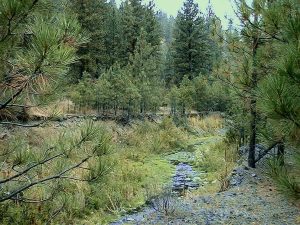 Support the
Support the
Washington Sewage Sludge Moratorium!
On Sept. 6, 2017, we announced our call for an immediate moratorium on approving any more sewage sludge permits to dispose of sewage sludge on agricultural land until the regulations catch up to the science.
Press conference was recorded.
Go HERE to send your message to Governor Inslee
and Ecology Director Bellon: Impose a moratorium now!
We have compiled a new document that goes into greater detail laying out our objections to the disposal of sewage sludge on agricultural lands. Go HERE to study our detailed objections.

The application of treated sewage sludge (euphemistically labeled “bio-solids”) to crop land is sadly gaining popularity as a cheap, but disgusting way to dispose of toxic waste. Currently, the well-being of the residents of Mill Canyon (near Davenport in Lincoln County, WA) is threatened by a proposed application of sewage sludge by a neighboring wheat farmer.
The sewage sludge would be applied to highly erodible soils (erodible by wind and water) right in the same watershed that supplies drinking and irrigation water to homes, farms and gardens in Mill Canyon. Tolstoy Farm, one of the oldest secular intentional communities in the US, is located in Mill Canyon. Tolstoy Farms, one of the oldest and most well known organic farms in the region that supplies produce to hundreds of customers is in Mill Canyon. While the water source for the vegetable farm is not within or downstream of the areas currently proposed for biosolids, Tolstoy Farms opposes the application of biosolids as well as the spraying of agricultural chemicals on the wheat fields in the area. Tolstoy Farms is very much opposed to biosolids use becoming an accepted practice in agriculture.
Go HERE to view a map showing the tributaries that feed Mill Creek, and ultimately the Spokane River, that are threatened with sewage sludge application.
Concern about spreading “bio-solids” in Mill Canyon is a local example of a national problem. The progressive journal In These Times has recognized the threat and has begun to publish a series of in-depth exposés of the hazards of municipal sewage sludge use on agricultural land. In These Times reports that “The Targeted National Sewage Sludge Survey, a 2009 EPA study, concluded that all sewage sludge contains toxic and hazardous materials.” They also report that what is in any given batch of sludge is “unknowable.”
Despite very strong and detailed arguments that have been communicated to the Washington State Department of Ecology by residents of Mill Canyon against the Department issuing a permit for this proposed sewage sludge application, unfortunately it is likely the Department will go ahead and grant the permit nonetheless, as is their habit.
Protect Mill Canyon Watershed (PMCW), is preparing to appeal any decision that would grant permission for sewage sludge to be applied to fields in their watershed. Filing such an appeal would be an expensive undertaking and should the permit be granted, PMCW will seek financial support from concerned citizens in order to mount an effective appeal.

Please sign our guestbook so that we can get in touch with you in the event the permit is granted. We will need your help in that struggle, should it come.
If we are successful and the permit is denied, it will set an important precedent for protecting the health and livelihoods of other Washington communities facing similar threat as well as the health and well-being of food shoppers who choose to purchase nutritious and tasty locally-grown produce that they would not want to be contaminated by municipal sewage sludge.
Read on if you want to learn more about this important issue.
Protecting the Mill Canyon watershed will require help and support from many people. Please sign our guestbook so that we have your contact information when and if it becomes necessary to engage the larger community in this struggle.
